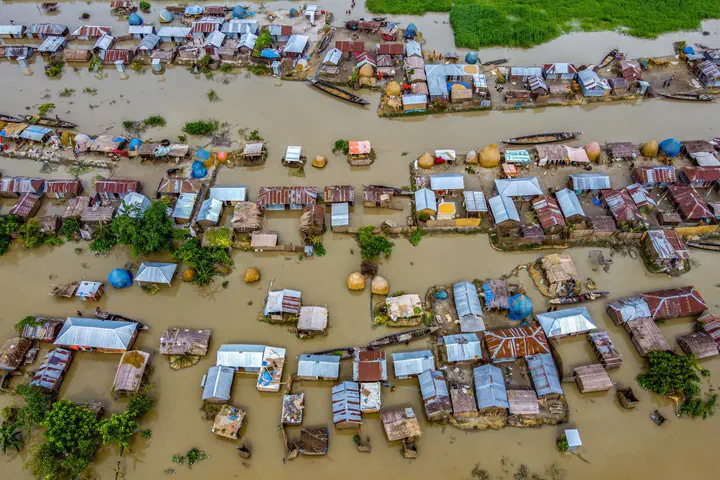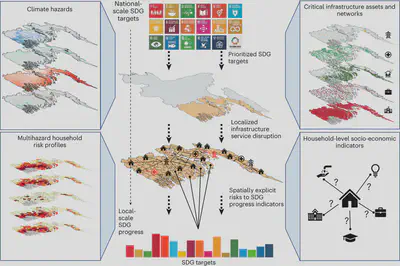New study shows that the poorest are more at risk from climate hazards

Climate hazards pose increasing threats to development outcomes across the world’s coastal regions by impacting infrastructure service delivery. Using a high-resolution dataset of 8.2 million households in Bangladesh’s coastal zone, OPSIS researchers assessed the extent to which infrastructure service disruptions induced by flood, cyclone and erosion hazards can thwart progress towards the Sustainable Development Goals (SDGs).

Results showed that climate hazards potentially threaten infrastructure service access to all households, with the poorest being disproportionately threatened in 69% of coastal subdistricts. Targeting adaptation to these climatic threats in one-third (33%) of the most vulnerable areas could help to safeguard 50–85% of achieved progress towards SDG 3, 4, 7, 8 and 13 indicators.
Co-author Sarah Gall, a DPhil student at the Environmental Change Institute (ECI), said: “Climate hazards are having a disproportionate impact on poor and vulnerable people and communities. This is a consequence of poorer people living in more exposed locations.
Alison Peard, ECI DPhil student and co-author, added: “We found, for example, that households in the poorest socioeconomic group were 1.13 times more likely to experience disruption to education facilities due to coastal flooding than households in the wealthiest group.
This is the first time, more detailed analysis has been used in this way combining information on the individual households socio-economic vulnerability, data about local facilities, and data of future climate hazards to estimate SDG progress at risk. The research can be considered a case study to illustrate the level of analysis that would be possible in any climate risk prone area where data on a household level is available to evaluate where infrastructure adaptation is required to safe-guard SDG progress on a household level.
In their study the researchers estimate 46% of households report no access to electricity across the region, while 18% are further than 5 km from their nearest healthcare facility. The reason that poorer households are more exposed in parts of coastal Bangladesh reflects several interacting factors, including typically highly resource-dependent livelihoods, insecure land ownership and an uneven distribution of accessibility to land, less capacity to migrate to cities where incomes are on average higher, land degradation linked to previous hazards, and a lack of protective infrastructure.
Amelie Paskowski, ECI Alumnus and co-author, added: “In our study we considered 3,770 cyclone shelters that have been built in the coastal region of Bangladesh. Our results suggest that poorer households are on average closer to cyclone shelters than households with higher socio-economic status, reflecting a long-standing policy of providing cyclone shelters for the most vulnerable in Bangladesh. This is widely regarded as a successful disaster risk reduction intervention, which we find to be measurably pro-poor.”
To fully achieve the government’s SDG targets, the researchers say new infrastructure will also have to be built across the coastal region and the rest of Bangladesh to reach populations that are underserved, not connected, or unable to benefit from infrastructure services due to a lack of proximity.
Dan Adshead, first-author and ECI Alumnus added: “The findings illustrate the potential of geospatial climate risk analyses, which incorporate direct household exposure and essential service access. Such high-resolution analyses are becoming feasible even in data-scarce parts of the world, helping decision-makers target and prioritize pro-poor development.”
The study was carried out with OPSIS DPhil students Sarah Gall and Alison Peard, Alumni Dr Daniel Adshead, Dr Amelie Paszkowski, and Dr Mohammed Sarfaraz Gani Adnan, with Senior Research Associate Dr Jasper Verschuur, under the guidance of Professor Jim Hall, OPSIS lead and Professor of Climate and Environmental Risk.
Read the paper in full: Climate threats to coastal infrastructure and sustainable development outcomes.